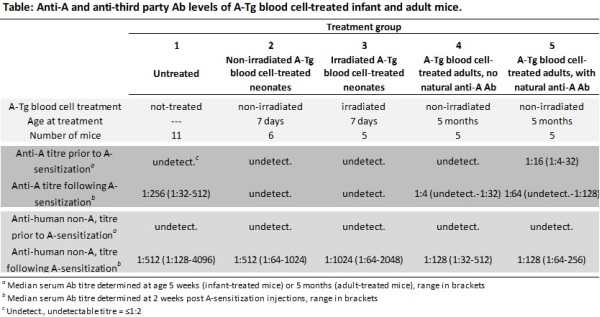ABO Tolerance after Treatment of Infant or Adult Mice with MHC-Matched A-Expressing Blood Cells
1Dept Pediatrics, Alberta Transplant Institute, Canadian National Transplant Research Program, University of Alberta, Edmonton, Canada
2Dept Chemistry, University of Alberta, Edmonton, Canada
3St Vincent's Hospital, Melbourne, Australia.
Meeting: 2018 American Transplant Congress
Abstract number: A397
Keywords: Antibodies, Heart, Mice, Tolerance
Session Information
Session Name: Poster Session A: Tolerance / Immune Deviation
Session Type: Poster Session
Date: Saturday, June 2, 2018
Session Time: 5:30pm-7:30pm
 Presentation Time: 5:30pm-7:30pm
Presentation Time: 5:30pm-7:30pm
Location: Hall 4EF
Purpose: ABO-incompatible heart transplantation (ABOi HTx) is safe during infancy and allows increased donor access. Post-ABOi HTx B cell tolerance develops to donor blood group antigen(s) by mechanisms not fully defined. We developed A-transgenic mice (A-Tg) that express A-antigen on vascular endothelium and erythrocytes and demonstrated A-antigen specific tolerance induced by HTx into 4 wk-old, MHC-identical, wild-type (WT) mice. Herein, we explored intentional tolerance induction in infant and adult WT mice using A-Tg blood cells.
Methods: WT BALB/c mice were injected ip (weekly[times]3) with intact A-Tg BALB/c blood cells (±40Gy irradiated), at age 7 days (neonates) or 5 months (adults; see Table). Two weeks after treatment, all mice were injected ip (weekly[times]5) with human A-erythrocytes ('A-sensitized') in an attempt to elicit anti-A antibody (Ab) production. Serum anti-A and 3rd-party (non-A anti-human) Ab were assessed by hemagglutination assay.
Results: In response to A-sensitization, high levels of anti-A Ab were produced in untreated mice (group 1, Table). In contrast, anti-A remained undetectable in A-sensitized mice previously treated as neonates with A-Tg blood cells ±irradiation (groups 2&3). Treatment of adult mice (groups 4&5) with A-Tg blood cells resulted in reduced anti-A production in response to A-sensitization compared with untreated mice (group 1). Adult mice with undetectable natural anti-A (group 4) produced less anti-A vs those with pre-existing natural anti-A (group 5). Third-party Ab responses were high for all groups.
Conclusions: Our results suggest that the erythrocyte component of A-Tg blood cells can induce robust A-antigen-specific tolerance in WT mice. Importantly, our findings suggest that tolerance to A-antigen is not limited to the neonatal period but can also be induced in adults. Intentional induction of tolerance to A/B-antigen(s) may allow subsequent ABOi HTx.
CITATION INFORMATION: Motyka B., Fersovich J., Lamarche B., Sosniuk M., Adam I., Pearcey J., Tao K., Cairo C., Cowan P., West L. ABO Tolerance after Treatment of Infant or Adult Mice with MHC-Matched A-Expressing Blood Cells Am J Transplant. 2017;17 (suppl 3).
To cite this abstract in AMA style:
Motyka B, Fersovich J, Lamarche B, Sosniuk M, Adam I, Pearcey J, Tao K, Cairo C, Cowan P, West L. ABO Tolerance after Treatment of Infant or Adult Mice with MHC-Matched A-Expressing Blood Cells [abstract]. https://atcmeetingabstracts.com/abstract/abo-tolerance-after-treatment-of-infant-or-adult-mice-with-mhc-matched-a-expressing-blood-cells/. Accessed February 20, 2026.« Back to 2018 American Transplant Congress

